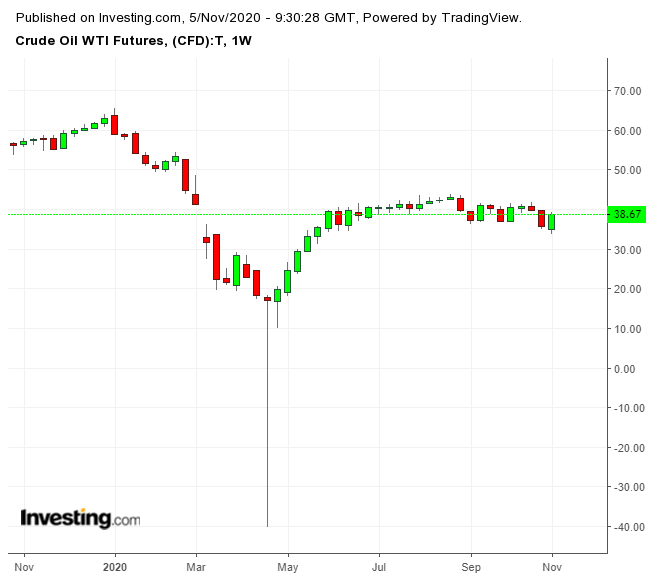Here's a warning concerning the U.S. election and markets.
Right now, no one knows what will happen, and we may not know for weeks. Although Biden is edging closer to victory, the race is still undetermined, with each side accusing the other of shenanigans. The courts will most likely have a say in the outcome in more than one state.
In 2000, the presidential election was not settled until the middle of December and that scenario could happen again.
Markets despise uncertainty and disputed elections are even worse since they increase tension, especially in the U.S., which prides itself on an idea of smooth transitions of power.
If a dispute continues for days and weeks, the markets—even commodities markets—will be harder to predict.
To jump in now, you must have an appetite for risk. With that in mind, let’s look at supply and demand issues for the WTI market:
Supply
The EIA (Energy Information Administration) reported an 8 million barrel draw in crude oil stocks in the United States for the week ending on Oct. 30. This means that in the month of October, U.S. crude oil inventories declined at a rate of about 1.4 million bpd.

This drawdown was helped by the hurricanes that disrupted oil production in the Gulf of Mexico. Hurricane season doesn’t end until Nov. 30, and right now Hurricane Eta is impacting Nicaragua. It remains a significant threat, and could turn towards Florida, though it is currently not anticipated to impact oil installations in the Gulf of Mexico. Unless demand and/or exports pick up in the fourth quarter, we shouldn’t expect to see this kind of draw down repeated, as production in the Gulf of Mexico will remain steady.
Libya’s oil production is escalating quickly now that the warring factions in its civil war have agreed to a ceasefire. Production hit 850,000 bpd on Nov. 3 and the National Oil Corp. in Libya expects to reach an average of 1 million bpd in November. It’s unlikely that OPEC will be able to exert any meaningful control over Libyan oil production prior to its meeting on Nov. 30. Even then, any quotas that Libya agrees to observe won’t impact its oil production until Jan. 1 at the earliest.
OPEC and OPEC+ will meet on Nov. 30 and Dec. 1 to consider oil output quotas for 2021, and it is looking like the group will decide against implementing the 2 million bpd increase that is supposed to begin Jan. 1.
In fact, OPEC and OPEC+ may set further cuts. Russian oil companies appear ready to maintain current production quotas as opposed to boosting production, in part because the limits on production will help them avoid paying more taxes under a recently implemented tax scheme. The new rules raise the taxes on Russian oil production from older oil fields.
Furthermore, The Wall Street Journal is now reporting that Saudi Arabia is looking to secure a consensus to cut OPEC+ production on Jan. 1. It is not known how much a cut Saudi Arabia would like to see, but according to Saudi officials cutting production “is now an option.” It isn’t clear though if this new cut would even be enough to compensate for the return of Libyan oil to the market.
As of now, it looks like no matter what agreement is made, we will see a rise in oil supply in the fourth quarter, and possibly into the first quarter of 2021. A new accord will almost definitely take effect on Jan. 1 and exist for a three-month term or longer. These OPEC+ agreements are generally not assessed based on daily activity, but based on output over the period, so it is possible to comply while overproducing early as long as the member underproduces later in the term.
Demand
As for demand, we have to consider the returning COVID lockdowns, especially in much of western Europe. In particular, the U.K., France and Germany—Europe’s largest economies—are all facing new lockdowns. The U.K. lockdown prohibits all international travel except for work and calls for all non-essential businesses and places of worship to close. Schools will remain open in the U.K., a difference from the earlier lockdowns, but the harsh restrictions on business and travel will remain in place for at least a month. France already imposed a second lockdown, which includes a requirement to provide sworn declarations in order to leave home. Schools will stay open, but curfews may still be imposed to limit travel and gatherings. Germany has also entered a milder lockdown than the one it implemented in the spring.
Mobility data from France last Friday, the first day of that country’s lockdown, showed that travel decreased by only 33% from pre-coronavirus life. In comparison, last March, during the initial lockdown, mobility decreased by 63%. Overall indicators of European economic mobility showed a decrease of 23.6% last week. These are early indicators that oil demand can be expected to drop in Europe, though not quite as much as it did in the spring.
There is much speculation that if Biden prevails in the election in the United States, he would support further lockdowns in American states if governors seek to impose them. Lockdowns, as we saw in the spring, have significant negative impacts on demand and instill ongoing fear, which also depresses oil demand.
